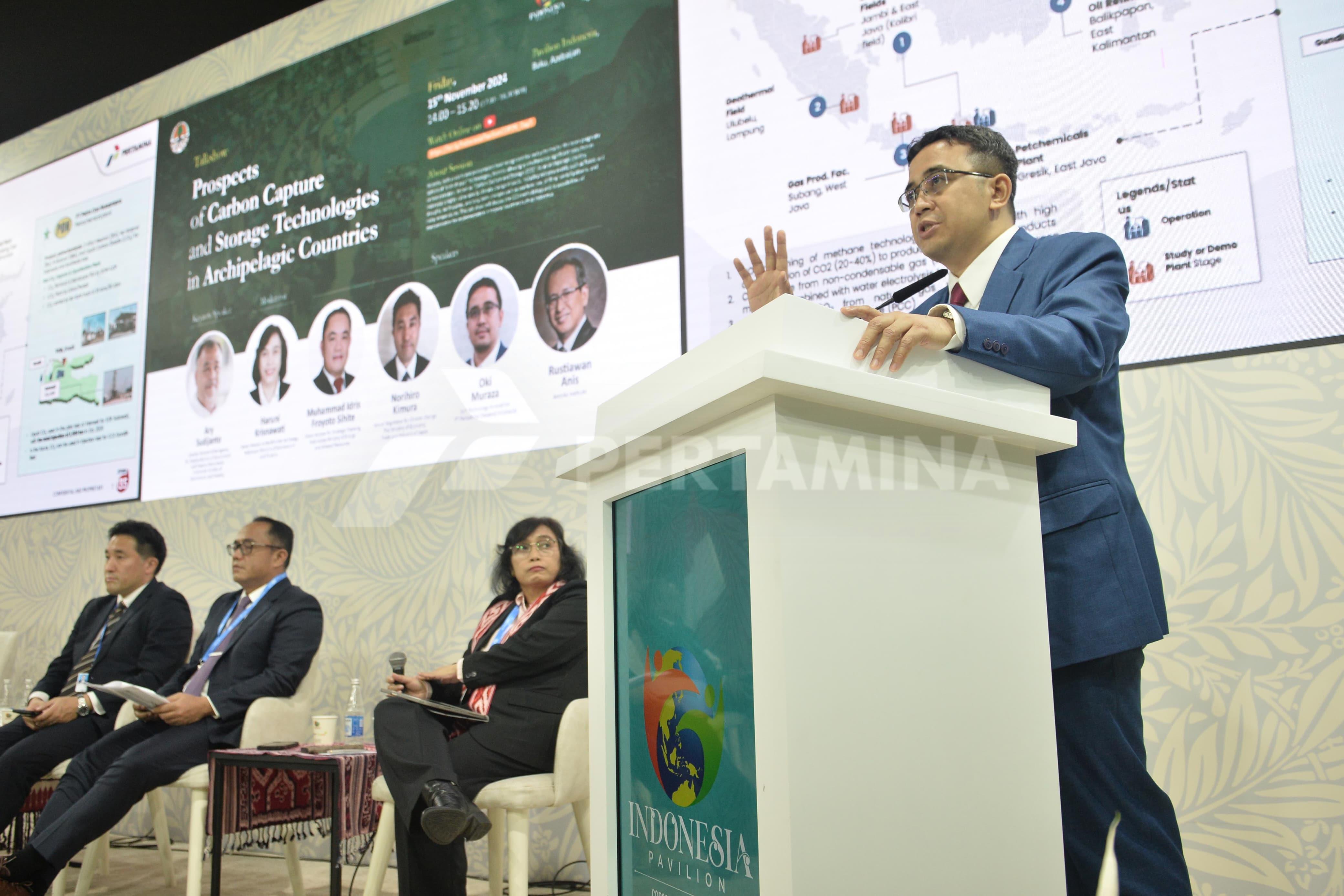 SVP of Research & Technology Innovation of Pertamina, Oki Muraza, was a speaker at the panel discussion on the "Prospects of Carbon Capture & Storage Technologies in Archipelagic Countries" at the Indonesia Pavilion, COP29, Baku, Azerbaijan, Friday, November 15, 2024.
SVP of Research & Technology Innovation of Pertamina, Oki Muraza, was a speaker at the panel discussion on the "Prospects of Carbon Capture & Storage Technologies in Archipelagic Countries" at the Indonesia Pavilion, COP29, Baku, Azerbaijan, Friday, November 15, 2024.
Pertamina: CCS/CCUS Development Will Significantly Contribute to Indonesia’s Emission Reduction
Baku, November 15, 2024 – PT Pertamina (Persero), as a leading energy company, is at the forefront of advancing Carbon Capture Storage/Carbon Capture Utilization and Storage (CCS/CCUS) initiatives in Indonesia.
Muhammad Idris Sihite, Senior Advisor for Strategic Planning of the Ministry of Energy and Mineral Resources, emphasized that the government supports Pertamina’s efforts by issuing regulations to strengthen its initiatives. The CCS initiative is also a concrete step by the government to achieve energy security.
"CCS is a support mechanism for the national oil and gas industry operations. It provides a solution for the industry to maintain production operations while reducing carbon emissions," Sihite stated during a panel at COP 29 on Friday (15/11/2024).
Sihite explained that Indonesia has a CCS potential of up to 577.62 gigatons. Currently, there are at least 15 studies and technological developments for CCS across the country’s oil and gas basins.
"Collaboration in funding and technology is crucial to realizing the CCS potential in Indonesia. This effort can significantly reduce emissions," Sihite emphasized.
The SVP of Research & Technology Innovation of Pertamina, Oki Muraza, stated that Pertamina fully supports the government’s target of achieving 8% economic growth in the future. Concurrently, Pertamina is also implementing strategies to reduce carbon emissions.
"Therefore, CCS and CCUS play a critical role in achieving the net zero emission (NZE) target by 2060 or earlier," Oki said at the same event.
Several studies conducted by Pertamina indicate a carbon storage capacity of up to seven gigatons of CO2, which could help achieve Indonesia’s NZE target. To realize this potential, a robust ecosystem is required, starting from CO2 source identification, transportation, injection, and storage basin management.
"The main challenge is the high cost of carbon capture. Hence, we are working on developing domestic capacity for this technology," Oki explained.
Pertamina has undertaken various CCS/CCUS initiatives, such as the Asri Basin CCS development in North Java and CCUS projects in the Jatibarang and Sukowati fields. Additional potential projects are also part of Pertamina’s plans.
"Indonesia has the potential to become a regional hub for CCS in the Asia-Pacific, considering that developed countries like Singapore, South Korea, and Japan lack adequate carbon storage capacity," Oki noted.
CCS projects require significant capital, advanced technology, infrastructure, and supportive regulations. The Indonesian government has begun issuing regulations, including the 2024 Presidential Regulation, to support CCS implementation and carbon trading.
"We also need fiscal incentives to make these projects economically viable. International cooperation is crucial. Pertamina has established various strategic partnerships with international partners to realize these initiatives," Oki concluded.
Pertamina, as a leading company in the energy transition, is committed to supporting the Net Zero Emission 2060 target by continuously promoting programs that directly impact the Sustainable Development Goals (SDGs) achievement. All these efforts align with Environmental, Social & Governance (ESG) implementation across all Pertamina's business lines and operations.**